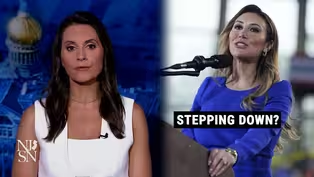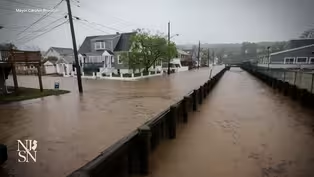NJ Spotlight News
Extreme rainfall research paused under Trump
Clip: 7/18/2025 | 4m 57sVideo has Closed Captions
Interview: Sarah Kaplan, climate reporter, The Washington Post
As the country faces twice the number of flash floods this July than in years past, a new tool that was designed to help predict future rainfall has been delayed by the Trump administration.
Problems playing video? | Closed Captioning Feedback
Problems playing video? | Closed Captioning Feedback
NJ Spotlight News is a local public television program presented by THIRTEEN PBS
NJ Spotlight News
Extreme rainfall research paused under Trump
Clip: 7/18/2025 | 4m 57sVideo has Closed Captions
As the country faces twice the number of flash floods this July than in years past, a new tool that was designed to help predict future rainfall has been delayed by the Trump administration.
Problems playing video? | Closed Captioning Feedback
How to Watch NJ Spotlight News
NJ Spotlight News is available to stream on pbs.org and the free PBS App, available on iPhone, Apple TV, Android TV, Android smartphones, Amazon Fire TV, Amazon Fire Tablet, Roku, Samsung Smart TV, and Vizio.
Providing Support for PBS.org
Learn Moreabout PBS online sponsorshipAnother agency that's facing significant cuts under the president's administration is Noah, the National Oceanic and Atmospheric Administration, and in particular, a research project that was being conducted there called Atlas 15 that helped to predict future rainfall.
That's an important tool for regional planners and civil engineers who are relying on decades old data in their planning and development.
Sarah Kaplan is a climate reporter for the Washington Post who first reported that the Trump administration would be delaying the release of Atlas 15.
She joins us now to explain.
Sarah, it's great to have you with us tonight.
I want to ask you, what is Atlas 15?
Can you explain the research that was going on there?
Yeah.
So, Atlas 15 is intended to be an updated data set of what scientists call precipitation frequency estimates.
So, if you've ever heard the phrase a one in 100year flood, which means like a flood that's expected to happen once every, you know, roughly 1% chance per year or once every hundred years.
That comes from these Noah data sets.
And scientists have known for decades that um the chance of these kinds of rainfall events is shifting because of climate change.
And so Atlas 15 was going to update the precipitation frequency estimates for the whole country based on historical observations and it was going to include um an extra forward-looking data set that would tell us how those estimates could change in the future.
How would that impact regional planners uh civic engineer civil engineers?
How would that impact their work?
Yeah.
So it's these estimates are hugely important.
If you are designing a highway for example and you know that it needs a culvert for water to go through during an extreme rainfall event, the size of that cover depends on how much rainfall you think you could potentially experience.
And so civil engineers will look to the Noah data set um to answer that question.
you know, if we're designing for to be able to withstand a 100-year rainfall event, you want to make sure that you are using the right numbers.
Um, it's also used by flood plane managers to understand, okay, what's the area that could potentially flood during heavy rainfall.
Um, all kinds of uses.
You you broke this story that there was this announcement that the project was being put on hold.
What was the explanation that was given as to why?
Yeah, so part of Atlas 15 is on hold.
This is the forward-looking part that takes into account climate change to tell us what precipitation could look like in the future.
And officials within Noah told me that it was intended at um you know, Commerce Secretary Howard Lutnik had ordered a review of that component to make sure that it was, you know, best serving the American people.
Um but they didn't say how long this hold is expected to ask or why they thought it might not be serving.
You mentioned part of the project is on hold.
explain volume one and volume two and what is being released.
So volume one is based on historical observations.
So for some parts of the country these estimates haven't been updated in like 20 years or more.
And so making sure that you have when you're sort of saying this is what could happen has a 1% chance of happening.
You want to know you want to include data from the past 20 years.
And that's what volume one was going to do was sort of bring the entire country up to date based on what we know has already occurred.
And then volume two would have been forwardlooking and saying, okay, based on how we know climate will change in the future, how could these things continue to change?
And that's really important for infrastructure because if you're building a bridge or a house or a highway, you want that to last decades, right?
And and within the decades, coming decades, we know that rainfall is going to be getting more intense.
you know, disaster preparedness has never really been a partisan issue before.
It's it's starting to feel like this perhaps is.
Is this part of a trend that we're seeing of of these types of projects being halted?
Absolutely.
Um we have seen the Trump administration um cancel or uh defund a lot of pro pretty much any research that has the phrase climate change in it.
Um, in the recent budget proposal that the administration presented to Congress, they proposed zeroing out all climate research at Noah.
Um, and they've canled the National Climate Assessment, which looks at how climate change is affecting the United States.
Um, so this definitely reflects, I think, the the administration's, you know, it's part of a pattern of the administration um kind of putting a hold on climate research.
Well, thank you so much for your perspective.
Terrific reporting.
Great to have you with us, Sarah Kaplan, climate reporter at the Washington Post.
Thank you.
Thank you.
Alina Habba's last days as U.S. Attorney?
Video has Closed Captions
Clip: 7/18/2025 | 1m 7s | Habba's interim U.S. Attorney role ends on Tuesday (1m 7s)
Debating FEMA's future as storms, floods worsen
Video has Closed Captions
Clip: 7/18/2025 | 5m 18s | Monmouth town faces floods and now loss of federal help (5m 18s)
Disabled NJ teens reclaim independence at summer camp
Video has Closed Captions
Clip: 7/18/2025 | 5m 8s | Rutgers' True Grit Camp is a safe space for kids with spinal cord injuries (5m 8s)
Providing Support for PBS.org
Learn Moreabout PBS online sponsorship
- News and Public Affairs

Top journalists deliver compelling original analysis of the hour's headlines.

- News and Public Affairs

FRONTLINE is investigative journalism that questions, explains and changes our world.












Support for PBS provided by:
NJ Spotlight News is a local public television program presented by THIRTEEN PBS


